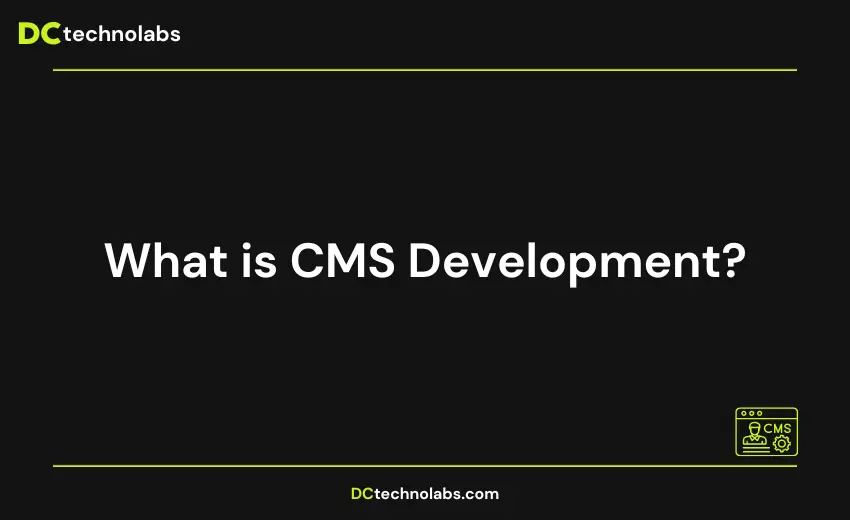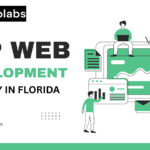
In today’s digital age, the ability to manage content effectively is paramount for any business seeking to maintain a robust online presence. Here, the role of a Content Management System (CMS) becomes crucial. A CMS simplifies the creation, management, and optimization of content, enabling businesses to engage their audiences effectively and efficiently. This guide aims to unfold the essentials of CMS development, offering insights into its functionalities, types, and benefits. Moreover, we’ll explore how companies like DC Technolabs leverage CMS platforms to enhance their web presence and meet diverse business demands.
Table of Content
What is CMS in the Context of Web Development?
A CMS, or Content Management System, is fundamentally a software application or a suite of related programs designed to create and manage digital content. In contrast to traditional static web pages, a CMS is dynamic, providing the tools necessary for non-technical users to easily produce, edit, and manage content. This dynamic capability is critical for websites that require regular content updates and additions, such as news portals, blogs, and e-commerce sites.
Exploring Different Types of CMS
In web development, Content Management Systems (CMS) are essential tools that facilitate the creation, management, and optimization of digital content. Based on their structure and usage, CMS platforms can be broadly categorized into three distinct types. Each type caters to different business needs and offers unique advantages and considerations.
- Open-source CMS: Platforms like WordPress and Drupal are widely popular due to their flexibility and robust community support. Being open-source means that the source code of these platforms is available for anyone to view, modify, and enhance. This accessibility fosters a large community of developers who continuously contribute to the system’s development, providing a rich ecosystem of themes, plugins, and extensions.
- Proprietary CMS: These platforms are developed and managed by specific companies. These systems are not openly available for modification by the public. Companies like Sitecore or Adobe Experience Manager offer these CMSs, often as part of a broader suite of digital marketing and content management tools.
- Cloud-based CMS: Platforms like Wix and Squarespace are designed for ease of use and efficiency. These platforms host the CMS along with the user’s website, simplifying many of the technical aspects of web management.
Each type of CMS serves distinct needs. Open-source CMSs offer flexibility and control, suitable for those who require extensive customization. Proprietary CMSs offer reliability and support, ideal for businesses that need robust, integrated solutions without the hassle of handling technical maintenance themselves. Cloud-based CMSs provide convenience and ease of use, perfect for small businesses or individuals who want to get their websites up and running quickly with minimal fuss. By understanding the different types of CMS available, businesses can make informed decisions that align with their specific requirements and capabilities.
How does a CMS Function?
A Content Management System (CMS) simplifies the process of building and managing a website by breaking down the workflow into several core functions. This modularity ensures that users of all technical levels can effectively manage online content without needing deep technical expertise.
Content Creation
The first major function of a CMS is content creation. A CMS typically offers a user-friendly interface, often referred to as a WYSIWYG (What You See Is What You Get) editor. This interface allows users to create content similar to how one would in a word processor, which is intuitive even for beginners. Users can add and format text, insert images, and even embed video and audio without directly writing or editing code.
Content Management
Once content is created, the next function is content management. This involves organizing the content in a logical and structured manner, making it easy to retrieve and revise. A CMS often uses databases to store content, separating the design and layout from the content itself. This separation allows users to manage content without risking the integrity of the website’s design or functionality. Additionally, a CMS provides tools to categorize and tag content, making it easier to manage large amounts of web pages and media files.
Publishing
The final core function of a CMS is publishing. After content is created and organized, it needs to be displayed on the website. A CMS handles this by allowing users to either publish content immediately or schedule it for a future date. This flexibility is crucial for maintaining a dynamic website that is regularly updated, such as news portals or blogs. Moreover, a CMS ensures that the published content is presented in an attractive and functional manner on the website, adhering to the predefined templates and styles.
These functionalities of a CMS not only simplify the web development process but also empower non-technical users to maintain and update their websites seamlessly, ensuring that the website remains dynamic and up-to-date without frequent intervention from developers.
Advantages of Using a CMS for Website Development
Adopting a CMS for website development offers numerous strategic advantages that can help businesses stay agile and competitive in a digital-first world.
Scalability
A CMS allows for easy scalability. As a business grows and its content volume or visitor traffic increases, a CMS can handle this increased load without the need for a complete redesign of the website. This ability to scale is crucial for businesses that anticipate growth or experience seasonal fluctuations in traffic.
Accessibility
With a CMS, website management can be performed from anywhere, as long as there is internet access. This remote accessibility is particularly beneficial in today’s mobile-first world, where being able to make quick updates or changes to the website from any location can significantly enhance business responsiveness.
User-Friendliness
CMS platforms are designed with non-technical users in mind, providing intuitive interfaces that don’t require coding skills. This user-friendliness democratizes web management, allowing content creators and marketers to make updates directly, without always needing to go through technical staff.
SEO Benefits
Most CMS platforms come equipped with built-in SEO tools that help optimize content for search engines. These tools might include options for customizing URL slugs, adding meta tags, and integrating social media, which enhances the site’s visibility and searchability. Additionally, many CMSs support plugins or extensions that further refine SEO strategies, such as improving page load speeds and generating sitemap files.
These advantages make a CMS an essential tool for any business looking to establish or maintain a robust online presence. By streamlining website management, enhancing accessibility, and improving SEO, a CMS helps businesses meet the dynamic demands of the online landscape.
Leading CMS Platforms Today
Choosing the right CMS platform is critical for any business looking to enhance its online presence. Different platforms cater to varied needs, from simple blogging to complex e-commerce solutions. Here’s a closer look at some of the most popular CMS platforms today, each known for its unique features and benefits:
WordPress
WordPress is arguably the most widely used CMS across the globe. It’s renowned for its vast plugin ecosystem and robust community support. WordPress offers flexibility that is hard to match, with thousands of themes and plugins that extend its functionality to fit nearly any need. From small personal blogs to large corporate websites, WordPress can handle it all. Its ease of use coupled with extensive customization options makes it a favorite among both novices and experienced developers.
Joomla
Joomla is another popular choice that offers a good balance between functionality and user-friendliness. While it may have a steeper learning curve than WordPress, it compensates with powerful built-in features. Joomla provides a range of customization options through extensions and templates. It is well-suited for social networking sites and e-commerce ventures, offering detailed user management and permission features.
Drupal
Drupal stands out for its strong security features and flexibility, making it ideal for complex, content-heavy, and high-traffic websites. It is a favourite among technical users who require a robust, scalable CMS capable of handling detailed content structures and data-heavy sites. Drupal’s modular approach and extensive API support enable developers to build highly customized solutions that meet specific business needs.
Shopify
Shopify is the go-to CMS for e-commerce solutions. It simplifies the online selling process by providing users with a suite of services designed specifically for e-commerce, including payment integration, inventory management, and a secure shopping cart. Shopify is known for its user-friendly interface, extensive customization possibilities through apps, and strong customer support.
Wix
Wix is a cloud-based design-centric CMS, perfect for creatives and those who prefer a visually appealing interface without delving deep into coding. It offers a drag-and-drop site builder, numerous templates, and add-ons which make it suitable for small businesses and personal portfolios. Wix’s intuitive setup and ongoing addition of new features make it a practical choice for users seeking simplicity and elegance.
Each of these CMS platforms offers distinct advantages depending on the user’s technical skills, business needs, and the type of project they are undertaking.
How DC Technolabs Powers CMS Development
At DC Technolabs, we understand that each business has unique requirements. This is why we specialize in customizing CMS platforms to align with your specific needs, whether you are setting up a simple blog or a complex e-commerce system. Our approach involves leveraging the latest technologies and industry best practices to develop a CMS solution that not only meets but exceeds your business expectations.
Our Customization Process Includes:
- Needs Analysis: Understanding your business goals, target audience, and functional requirements.
- Platform Selection: Helping you choose the right CMS that best fits your business strategy and growth plans.
- Custom Development: Enhancing the chosen CMS platform with custom plugins, themes, and integrations to ensure it serves your business effectively.
- Quality Assurance: Rigorous testing to ensure the platform is secure, responsive, and user-friendly.
- Training and Support: Providing your team with the necessary training to manage the CMS effectively and offering ongoing support to address any future needs.
By integrating these tailored services, DC Technolabs ensures that your CMS solution not only streamlines content management but also enhances user engagement and operational efficiency, ultimately driving business success.
Conclusion
Understanding CMS and its impact on web development can transform how you manage online content. With the right CMS, you can streamline your web management processes and better adapt to the digital demands of your industry.
Ready to develop a powerful CMS-driven website? Contact DC Technolabs today to learn how our expertise can help elevate your online presence through tailored CMS solutions.
If you found this blog helpful, check some of the other blogs below:
Explore more about CMS development and stay updated with the latest trends and insights by visiting our blog regularly. Stay connected with us for more insights and updates! Follow us on Instagram, Facebook, LinkedIn, and Twitter to be part of our growing community.






